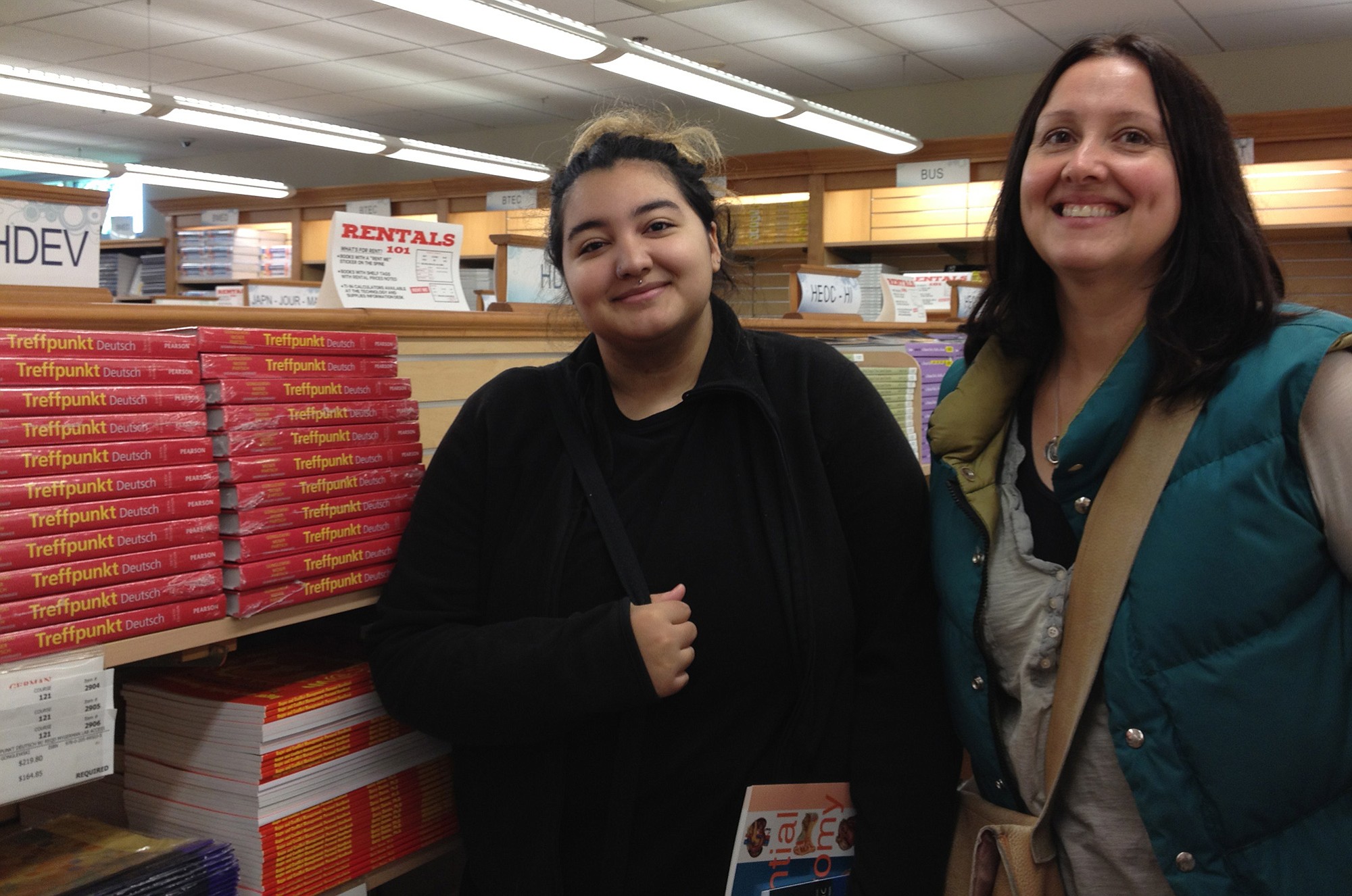Learn how Washington students are coping with high textbook prices: http://washpirgstudents.org
Learn more about open education resources in Washington: www.openwa.org
Jemma Gonzales and her mom, Brynn Gonzales, stood in an aisle at the Clark College Bookstore, looking at the required textbook for the 18-year-old’s German class.
A new book costs $219.80. A used book, at $164.85, costs $55 less. But all of the used books already had been snapped up by bargain-hunting students. The book wasn’t available as a rental or an e-book, the other formats sometimes offered in the bookstore.
College students are experiencing sticker shock when shopping for textbooks, which have seen their prices rise four times faster than inflation.
The mother-daughter duo had thought shopping a week before classes began was early enough to find used books. But they were going home and ordering it through a discount book website.
“I found it online for $122,” said Brynn Gonzales.
Buying options
Students have a number of ways to get textbooks: buying or renting from the college bookstore, e-books, buying discounted books online or borrowing or sharing books with other students.
Nicole Morford cradled Evan, 11 months, in her arms so she and her husband, Lawrence Morford, could fill their son’s stroller with textbooks. The Morfords, who live in Washougal, said price is always a factor. For his computer technology class, Lawrence Morford had selected the $98 e-book rather than the $237 hardcover book.
Sandy Cobb, a bookstore clerk, recalled a student who changed his classes four times in the quest to find textbooks he could afford.
One alarming consequence of exorbitant textbook prices is that many students are choosing not to buy their book. A study released by the U.S. Public Interest Research Group in January revealed that 65 percent of students surveyed didn’t buy a textbook because it was too expensive. Of those students, 94 percent said they worried their grade would suffer without having access to the textbook.
Textbook costs vary greatly, depending on the educational field. Nursing 110 requires students to buy 11 books, costing about $800 combined. However, students use those books throughout their program and in their careers.
The Clark College bookstore introduced the option to rent textbooks in 2008. For the last two years, textbook rentals have made up 15 percent of textbook transactions, said Monica Knowles, bookstore manager.
Clark students save more than $150,000 per quarter by renting textbooks rather than buying them, Knowles said.
An automotive technology textbook costs $120.75 new and $70 for a used copy. But students have the option of renting a new copy for $106.75 or a used copy, if available, for $45.75. Students pay a replacement fee if rental books are damaged or lost.
The bookstore recently rolled out a Web comparison shopping tool to help students compare textbook prices at the bookstore with those of a variety of online discount booksellers. This fall’s Web order sales have increased 30 percent over last fall, Knowles said.
At the bookstores at both Clark College and Washington State University Vancouver, e-book transactions make up 1 percent of all book transactions.
The Bookie, the WSU Vancouver bookstore, operated by Barnes & Noble College Booksellers, also offers new, used, rental, e-books and online sales to give students multiple options.
“We are really concerned that our textbooks are affordable,” said Mike Caulfield, director of blended learning at WSU Vancouver. “We have a lot of working students who are pinching pennies to attend here.”
Professors also are aware of textbook costs. They must submit textbook choices several months in advance to allow the college bookstore time to acquire used books, if available.
WSU Vancouver anthropology professor Clare Wilkinson-Weber has dealt with textbook prices as an instructor, an author and a parent of college students. When she assigns textbooks to her students, she tries to find less expensive options.
Publishers set textbook prices. For the latest book she wrote, Wilkinson-Weber chose a publisher that offers a paperback version, which costs less than $21. However, the hard cover book is $70. She has not assigned her own books in her classes.
As a mother, Wilkinson-Weber has scoured online discount sites for the best textbook options for her children, Evan Weber, a senior studying anthropology and history at WSU in Pullman, and Ceri Weber, who recently graduated from University of Washington with a biology degree. Her daughter’s science-heavy courses required significantly more expensive textbooks, sometimes costing $200 each.
Particularly for math and science courses, traditional textbook publishers often bundle online practice tools, which increases prices, sometimes by as much as $160 per student.
“I can’t tell you why textbooks are more expensive, but I do know as a parent, when you’re paying tuition and textbooks, you’re stunned by how much money this is,” she said.
Textbooks are sold in a way much like pharmaceuticals, Caulfield said. Publishers’ sales representatives visit professors on campus and make sales pitches for new textbooks. It’s an inefficient, outdated sales model, he said.
Open source
As frustration over textbook costs accelerates, a new wave is gaining momentum in higher education, Caulfield said. Open educational resource utilizes open textbooks, which are educational materials available online at little or no cost.
WSU Vancouver is dipping its toe into the open educational resource pool. Last spring, it began offering three sections of algebra using open source materials instead of traditional textbooks. Caulfield is working with professors and consultant Lumen Learning of Portland on the pilot program.
The benefits of open source textbooks for students are no-brainers. Students access the materials at no cost, from the first day of class. Quality open source material is abundant, particularly for the first two years of college, when most students are fulfilling general requirements, said Kim Thanos of Lumen Learning.
“The opportunity for change is significant and it’s moving very quickly,” said Thanos. “If I’m putting a timeline on it, I think fall 2017 is when you’ll see a significant enough tip toward open resources.”
Beginning in January, Clark College will be one of 13 community colleges in Washington piloting an online business transfer degree that uses no traditional textbooks, but favors all open resource materials instead, said Connie Broughton of the Washington State Board of Community & Technical Colleges.
Jill Darley-Vanis, an English composition and literature instructor at Clark College, says she and other instructors use as much open source material as possible.
“The textbook folks know this has been a good gravy train, and it’s coming to an end,” said Darley-Vanis.
Why do publishers put a premium price on textbooks?
“Because they can,” said consultant Michael Feldstein. “Because up until fairly recently, they have been able to raise prices and students have paid those prices.”
Feldstein works with both textbook publishers and colleges as they venture into the uncharted waters of online education materials. Textbook publishers are pouring money into creating adaptive online content.
Change is coming rapidly to the college textbook industry, he said. He noted that some of the biggest textbook publishers have addressed the changing market and textbook model.
“These companies are not doing well financially,” Feldstein said. “They expect to be out of the traditional textbook business within five years.”
Will that mean lower prices for students? Lower, but not an enormous relief for students and their parents, Feldstein predicts.
“Textbook publishers are betting on the idea that they have more money and can develop richer capabilities that are worth paying for,” Feldstein said. “That’s how they hope to stay in business.”




